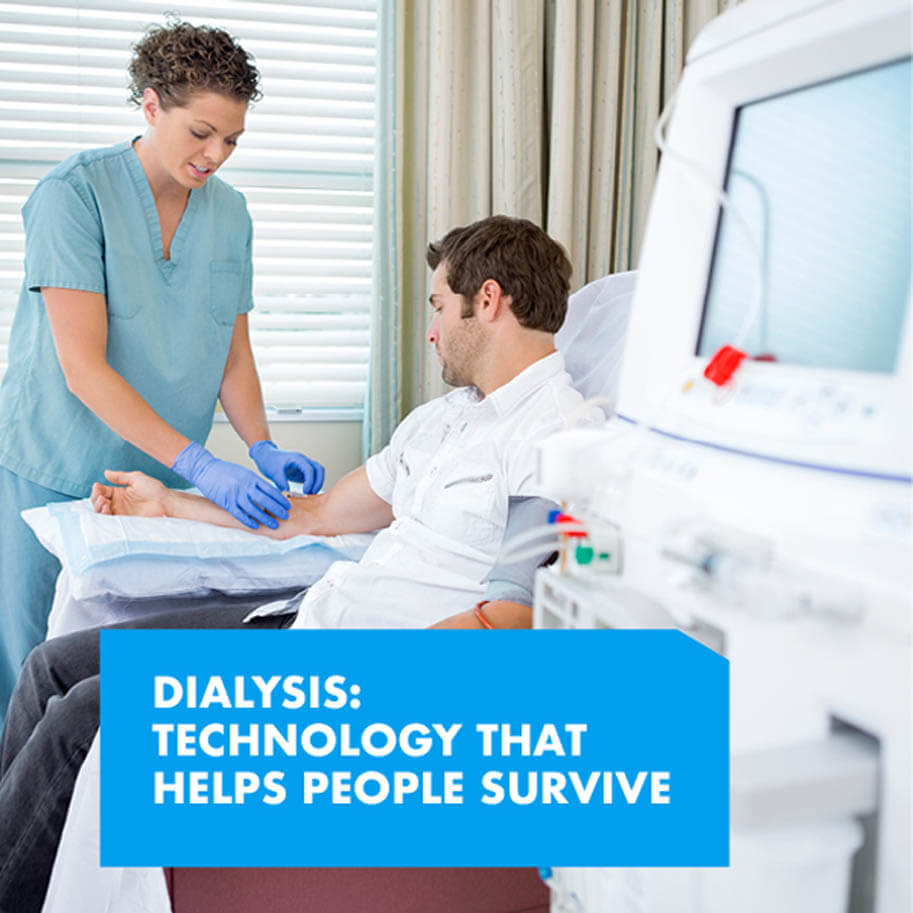
Dialysis: Technology That Helps People Survive
If a person’s kidneys are not working properly – for example, because she or he has advanced chronic kidney disease (kidney failure) – the kidneys may not be able to clean the blood properly. Waste products and fluid can build up to dangerous levels in their body. Left untreated, this can cause a number of unpleasant symptoms and eventually be fatal. And the doctor will recommend starting dialysis.
What is Dialysis?
Dialysis is a procedure to remove waste products and excess fluid from the blood when the kidneys stop working properly. It often involves diverting blood to a machine to be cleaned.
Who created Dialysis?
Back to the 1940s, the first type of dialyzer was built in 1943 by Dutch physician Willem Kolff. Koff named it as the artificial kidney, he had first gotten the idea of developing a machine to clean the blood after watching a patient suffer from kidney failure.
Over the next two years when his invention was completed, he attempted to treat over a dozen patients with acute kidney failure. Although only one treatment turned out successful, he continued to experiment in improving his design.
More experimentation led to the manufacturing of an improved design in the early 1950s. However, Kolff’s device only treated acute kidney failure and not end stage renal disease (ESRD). Then Dr. Belding Scribner, a professor of medicine at the University of Washington continued his work. Scribner developed a way for ESRD patients to receive treatment through an access point in their arm.
In 1962, Scribner opened the first official dialysis clinic for patients. He eventually developed a portable dialysis machine that allowed patients to receive dialysis treatment at home. By 1973, 40 percent of dialysis patients were doing their treatments at home.
Nowadays, over 90 percent of dialysis patients receive treatment at dialysis centers. Many more treatment options have become available, including peritoneal dialysis, home hemodialysis and nocturnal in-center treatment.
There is no cure for kidney failure, but with treatment it is possible to live a long, fulfilling life. Having kidney failure is not a death sentence. People with kidney failure can live active lives and continue to do the things they love with dialysis. Are you interested in making an innovative machine to help more people survive?
This is the right time for you to start! It’s time for you to start contributing to help people in another way beside being a doctor. You can be a biomedical engineer. Biomedical engineering studies have the goal of improving health care by applying engineering principles. It combines basic sciences and engineering to develop, improve, and produce medical equipment or methodology. The applications are wide, such as medical instruments, rehabilitation and assisting devices, medical imaging, cell engineering, bioinformatics, and many more. Biomedical Engineering SGU will prepare you for these.
And Swiss German University is the best place to study Biomedical Engineering with many reasons for you to consider. First, you will be learning with English that can help you to face the globalization era with the adaptable curriculum that provide diverse subjects from Medical Instrumentation, Biomechanics, Biomaterials, Biosensors, Bioinformatics, Medical Biotechnology, Rehabilitation Engineering, to Clinical Engineering, and other relevant subjects
Another thing you can get from learning Biomedical Engineering in SGU, besides having an internship program in Indonesia in their third semester, you will also have a double degree program in Germany. You have the choice to do an internship or study abroad in our partner universities in Europe in the sixth semester and take several classes in Germany.
As we know that German always leading to the latest technology. And by internship in German you will have the chance to get experience from a multinational environment with people who are also passionate in the field of Biomedical Engineering and introduce you to the environment of hospital management, medical industry, and research institutions.
Biomedical Engineering students at SGU will also get valuable courses such as faculty compulsory courses (Calculus, Physics, Chemistry, and Entrepreneurship), department compulsory courses (Electrical Engineering, Introduction to Biomedical Instrumentation, Biomedical Instrumentation). This combination of theory and industrial practicality, helps you to prepare facing the globalization era with strong competency needed.
With a Biomedical Engineering degree, you can build your future career in engineering principles to find the solution of this pandemic with the goal of improving health care. It is a unique expertise for your future career.
- Hospital & Clinics : clinical engineers, consultants for Biomedical Equipment.
- Industries : production manager, maintenance & quality control manager, R&D engineer, sales engineer
- Researcher : develop technology and method for healthcare improvement
- Government sector : regulator, bureaucrat
About SGU
SWISS GERMAN UNIVERSITY (SGU) is an international university in Indonesia, was established in 2000 as a joint effort between Indonesia, Germany, Switzerland, and Austria. We are the pioneer in offering international curricula in Indonesia. Qualified students can graduate with a Double Degree from Indonesia and Germany, which SGU provides in cooperation with partner universities; surely a valuable tool for your future careers. Ever since its establishment, SGU has been dedicated to delivering quality education in line with international standards and aims to develop skilled professionals who meet the demands of the industry. In order to achieve its objectives, SGU offers quality-oriented learning through 12 Bachelor’s Degree Programs and 4 Master’s Degree Programs ranging from Engineering, Information Technology, and Business to Life Sciences and Social Sciences. Furthermore, with small class sizes, and with English as the medium of instruction, you can look forward to pursuing your tertiary education and degree with full confidence.
Curriculum Back
